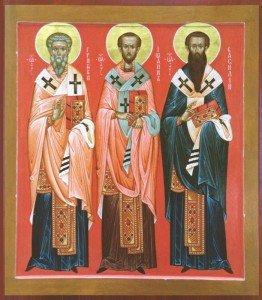 To continue our thought about the Eucharistic action in Christological terms, we say that the Spirit of God anoints all the faithful within the communion of the Body of Christ (i.e., the Church), which they have joined through personal acts of faith. Here again we see that we are called to co-operate with God. He gives us the help we need (i.e., the faith) to be joined with Him but we have to respond to this help.
To continue our thought about the Eucharistic action in Christological terms, we say that the Spirit of God anoints all the faithful within the communion of the Body of Christ (i.e., the Church), which they have joined through personal acts of faith. Here again we see that we are called to co-operate with God. He gives us the help we need (i.e., the faith) to be joined with Him but we have to respond to this help.
The approach to Christology that was based on the notions of communion between divinity and humanity, of “deification,” of the communication between the two natures of Christ implied an interpretation of redemption within a context broader than the juridical images used by Paul in Romans. These Pauline images, conceived within the framework of a Christian reading of rabbinic law, were given a philosophical and metaphysical dimension in Western scholasticism, so that salvation began to be interpreted in terms of vicarious atonement: the sacrifice of Christ on the cross, because he was God, was sufficient before God’s justice to atone for the sins of all humans. In this view, God and creation remain naturally external to one another and the work of Christ is seen as a satisfaction of an abstract notion of divine justice. In the East, symptomatically, during debates on the meaning of redemption, a series of councils meeting in Constantinople in 1156-1157, approved the approach of Nicholas of Methone to the notion of sacrifice. According to Nicholas, redemption should not be conceived as an “exchange”, but as a “reconciliation” and an act of divine forgiveness. God, Nicholas wrote, “God not have to receive anything from us…. We did not go to Him [to make an offering] but He condescended toward us and assumed our nature, not as a condition of reconciliation, but in order to meet us openly in the flesh.” We need to think about how different the East is from the West with regard to redemption. The spiritual doctrine of salvation through the process of deification (i.e., Theosis), could have been identified as a Neoplatonic idea or conception of “merger” between God and creation, if there was not, at its very center, the very strong theopaschite affirmation by Cyril of Alexandria: “The Son of God suffered in the flesh.” I shall start with Cyril’s idea in the next issue of this article since I think that it is critical for our idea of redemption in the Eastern Church.
